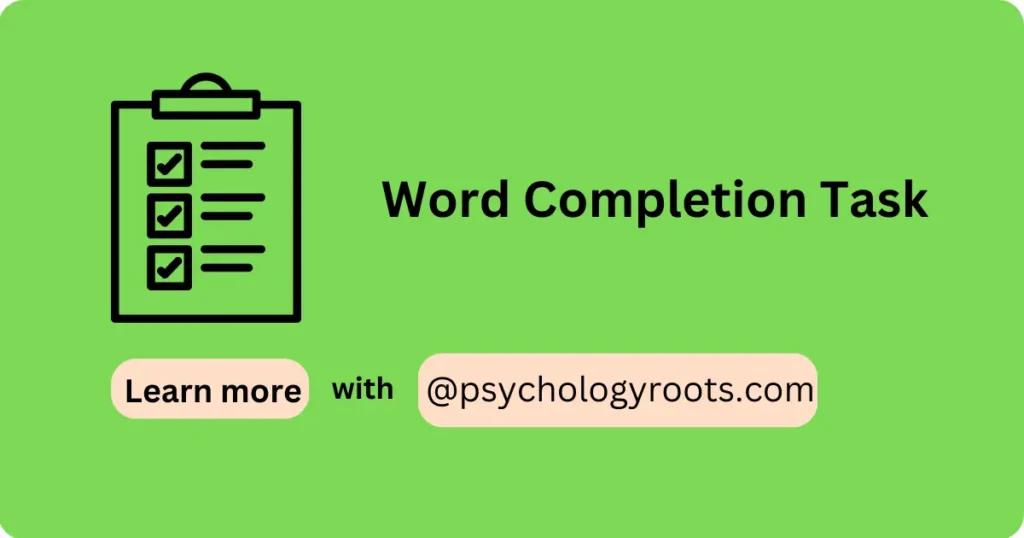Table of Contents
Word Completion Task
Here in this post, we are sharing the “Word Completion Task”. You can read psychometric and Author information. We have thousands of Scales and questionnaires in our collection (See Scales and Questionnaires). You can demand us any scale and questionnaires related to psychology through our community, and we will provide you with a short time. Keep visiting Psychology Roots.
About Scale Name
Scale Name
Word Completion Task
Author Details
Craig A. Anderson
Translation Availability
Not Sure

Background/Description
The first use of these materials was in a set of studies on the effects of brief exposure to violent video games on a variety of aggression-related variables. It was also used in several music lyric studies. Both articles are referenced below. Researchers may use these materials free of charge for research purposes, with proper citation to one of the references listed below.
Most of the 98-word fragments in this list have several possible correct completions. Fifty of the fragments can yield words that are clearly aggression-related. There may be aggressive completions possible for some of the remaining 48 fragments, but we have not found any yet.
There are several ways to administer the Word Completion Task. For example, in one of our studies participants were told that they were looking at a list of words with letters missing and that their task was to fill in the blanks to make complete words. Participants were given three minutes to complete as much of the word task as they could. Participant responses were coded into the following categories: aggressive words, neutral words, ambiguous words, and non-words.
One could give participants more time, less time, or an unlimited amount of time to work on the task. This task could easily be computerized so that the researcher could control how long each word fragment appears on the screen before moving on to the next word.
Scoring can also be done in a variety of ways. The next few pages list completions that our participants have created, coded into the following four categories: neutral, ambiguous, aggressive, and non-words. The final pages list the word fragments in two duplicate columns. We simply cut each sheet in half after printing these stimuli to create two narrow “booklets” from each 8 1/2″ x 11″ set of pages. This conserves paper and printing costs.
Administration, Scoring and Interpretation
N/A
Reliability and Validity
N/A
Available Versions
98-Items
Reference
- Anderson, C.A., Carnagey, N.L., & Eubanks, J. (2003). Exposure to violent media: The effects of songs with violent lyrics on aggressive thoughts and feelings. Journal of Personality and Social Psychology, 84, 960-971.
- Anderson, C. A., Carnagey, N. L., Flanagan, M., Benjamin, A. J., Eubanks, J., & Valentine, J. C. (2004). Violent video games: Specific effects of violent content on aggressive thoughts and behavior. Advances in Experimental Social Psychology, 36, 199-249.
- Carnagey, N. L., & Anderson, C.A. (2005). The effects of reward and punishment in violent video games on aggressive affect, cognition, and behavior. Psychological Science, 16, 882-889.
Important Link
Scale File:
Disclaimer
Please note that Psychology Roots does not have the right to grant permission for the use of any psychological scales or assessments listed on its website. To use any scale or assessment, you must obtain permission directly from the author or translator of the tool. Psychology Roots provides information about various tools and their administration procedures, but it is your responsibility to obtain proper permissions before using any scale or assessment. If you need further information about an author’s contact details, please submit a query to the Psychology Roots team.
Help Us Improve This Article
Have you discovered an inaccuracy? We put out great effort to give accurate and scientifically trustworthy information to our readers. Please notify us if you discover any typographical or grammatical errors.
Make a comment. We acknowledge and appreciate your efforts.
If you have any scale or any material related to psychology kindly share it with us at psychologyroots@gmail.com. We help others on behalf of you.